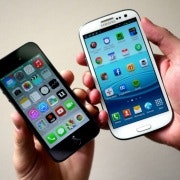iCopy: Samsung's IP smoking gun
A jury is still yet to reach a verdict on how much Samsung owes Apple for ripping off key features of the iPad and iPhone in what is a crucial battle between the two biggest profit makers in the electronics industry.
If you don’t know the background, last year a separate jury awarded Apple slightly more than $US1 billion in damages relating to its patents that Samsung was found to have breached when designing aspects of its smartphones and tablets. However that amount was reduced by about $US450 million in March after Judge Lucy Koh ruled that original verdict was flawed because jurors miscalculated the period that the infringement occurred for 13 Samsung devices.
Apple wants $US380 million of the $US450 million Judge Koh slashed from the original $US1 billion decision. Samsung argues that it owes Apple no more than $US52 million.
Samsung’s attorney Bill Price told the US federal court this week that while his client admits it “crossed the line” with the design of some of its smartphones and tablets, “Apple doesn't own beautiful and sexy."
One of the major problems though for Samsung in defending itself is that its own internal emails pretty much expose the South-Korean giant as a peeping tom.
Apple attorney Bill Lee took great delight in reading an email from Samsung’s head of mobile, JK Shin, in which he admitted the company was experiencing a “crisis of design” due to competition from the iPhone and that the difference between the companies’ phones was like “heaven and earth.”
Lee said the email showed that Samsung lacked confidence in its user interface.
“Let’s make something like the iPhone,” Lee said, citing the Shin email.
Samsung’s Price tried to convince the eight-person jury that “these patents are very narrow” and that “Apple has tried to mischaracterise these patents so they are the iPhone.”
He somewhat disingenuously though attempted to convince the jury that “$US52 million is not a trivial sum.”
Price knows this isn’t about the multibillion dollar company paying $US52 million or even $US380 million.
It is about the jury’s decision setting a precedent that will be used in future battles. Samsung doesn’t want similar judgments on more recent products as well.
Another Apple attorney, Harold McElhinny, ensured that very point was left in the minds of the jury as he delivered his closing argument.
"This is an important case. This is not about punishment. This is not about pitchforks. This is not about getting even. If juries take the profit out of patent infringement, then patent infringement will stop."
The jury has been deliberating all week, only breaking to ask the judge for calculators.
That clearly wasn’t a reassuring sign for Samsung, which has now asked for the retrial to be put on hold because the US Patent and Trademark Office had said one Apple patent might not be valid.
Apple said Samsung’s strategy “has crossed the bounds of reason” and that it would “suffer extreme prejudice from having the deliberations aborted, which ultimately would require a retrial of the retrial.”
It is clearly desperation point for Samsung, which is obviously stalling.
The other major problem for Samsung is that its integrity has already found to be lacking.
Earlier this month another judge ruled that Samsung has breached a court-ordered agreement to keep Apple documents obtained during the discovery process private.
The judge found that Samsung shared Apple’s patent licensing agreements with Nokia and Ericsson. Not a good look to say the least. It’s punishment for that is to be determined on December 9.
The jury in this week’s case can decide that Apple lost profits as a result of Samsung’s products being in the market. Or it could decide that Samsung must pay royalties for each device it has sold that carries features covered in the patents.
The jury will have to answer just two brief questions: the dollar amount owed to Apple, and the breakdown of those damages for each of the 13 Samsung products.
McElhinny says the "big question" will be how much Apple lost from the sales of the 13 Samsung devices. He argues that consumers would have bought iPhones and iPads if Samsung had not been selling devices it considers copies of Apple products.
In September, Apple finally regained top spot in smartphones sales which Samsung had dominated since May.
Apple’s 4.8 million iPhones sold during September accounted for 38 per cent of the US smartphone market.
The new iPhones squeezed Samsung’s Galaxy S4, as the 5S led individual sales and the colourful 5C finished third.
Samsung’s renewed dominance in the smartphone and tablet markets is why the latest verdict will be so crucial.
The federal court case this week is just the curtain raiser to a potentially more bruising case to be heard in March next year over a different set of patents relating to Samsung and Apple’s newer products.
Given Samsung’s higher sales, a jury could decide on a figure in excess of $1 billion if it is believed that Samsung is still cheating off Apple’s homework.
In a separate case on Monday, Apple won an appeal court verdict which could mean that it will be able to enforce sales bans against a number of Samsung products for infringing functional patents – relating to how they work, not how they look – first used on the iPhone.
Samsung knows that if the jury comes back with an unfavourable verdict then its nightmare is just beginning.
Mathew Murphy is a Walkley Award winning reporter based in New York.
















